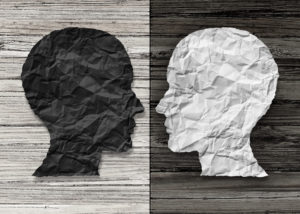Psychiatric disorders often coincide with alcoholism and drug addiction, and vice versa. Acknowledging this fact is imperative in successfully treating each condition. At Northbound Treatment, we’ve witnessed the positive outcomes of co-occurring disorder treatment for many recovering addicts and strongly believe in its effectiveness.
But what is a co-occurring disorder, and what does it mean for drug and alcohol rehab? Northbound is committed to providing individuals and their loved ones with the information they need to start the journey to sobriety. We’ve outlined the co-occurring disorders definition below, along with everything else you should know about the treatment approach.
Co-Occurring Disorders Definition
If someone has co-occurring disorders, they suffer from more than one medical condition. With regard to rehab, it means they have substance abuse disorder (SUD) as well as a mental health condition. When both conditions are identified, patients receive what we call a dual diagnosis.
With a long list of diagnosable mental conditions and a wide variety of addictive substances out there in the world, there are nearly endless combinations of co-occurring disorders[1]. There are many dual diagnosis examples to help us understand these disorders. For instance, a person struggling with alcoholism might also suffer from codependency, depression, bipolar disorder, or anxiety. Someone with an opiate addiction may be facing PTSD (post-traumatic stress disorder), borderline personality disorder, or a gambling addiction. An individual with a heroin drug addiction might also have major depressive disorder (MDD) or another mood disorder. The list of potential dual diagnoses goes on and on.
The relationship between substance abuse disorders and mental illness first gained attention in the medical community in the early 1980s[2]. However, while there is substantial evidence supporting the effectiveness of dual diagnosis treatment, the technique is often not adopted as part of drug and alcohol rehabilitation.
Getting Treatment for Co-Occurring Disorders
So what is dual diagnosis treatment? Though data shows dual diagnosis rehab has higher success rates than treating multiple conditions separately (or disregarding one altogether), only 18% of substance abuse programs in the United States meet the criteria. Likewise, just 9% of mental health services are equipped to treat co-occurring addiction[3].
In recent years, dual diagnosis treatment has seen increased awareness, with the benefits almost universally recognized by healthcare providers. Still, finding a rehab facility with integrated treatment options can be a challenge. Many recovering addicts end up going back and forth between providers to meet all their care needs. And sadly, a significant portion only receives treatment for one of their conditions, and sometimes, neither.
When it comes to drug and alcohol rehab, Northbound Treatment is ahead of the curve. We’re committed to helping our clients not only get sober but also achieve long-term sobriety. When a mental health disorder is either unknown or ignored, it can hinder a person’s recovery and heighten their risk of relapse. That’s why many of our rehab plans include dual diagnosis treatment.
If you’re searching for a rehabilitation center with a comprehensive dual diagnosis program designed to address both substance abuse and mental illness, please don’t hesitate to contact us. In the event our rehab centers aren’t the right fit, we’ll refer you to another facility that surpasses our own standards of care.
Insurance Coverage and FMLA Protections for Co-Occurring Disorders
Previously, insurance coverage for both co-occurring disorders and substance abuse treatment was hard to come by. But thanks to the Mental Health Parity and Addiction Equity Act of 2008 and expansions from the ACA (Affordable Care Act) in 2014, health insurance plans have to cover these conditions at the same level as other illnesses. Also, substance abuse and mental health treatment are now billed as essential healthcare. This means you’re covered for co-occurring disorders treatment services, even if you haven’t met your annual deductible.
You also have some protections under the Family and Medical Leave Act (FMLA). The 1993 law requires employers with 50 or more employees to allow up to 12 weeks of leave for medical or family-related matters. Rehab and mental health treatment are included under the ruling, and your employer can’t fire you for taking time off to get help. Though FMLA doesn’t require employers to provide paid leave, your job will be waiting for you when you return.
The Importance of Dual Diagnosis Rehab
Addressing mental illness is a critical component of overcoming substance abuse disorder. When an underlying condition is left undiagnosed or swept under the rug because a provider isn’t qualified to treat it, substance abuse can become even more problematic. The best way to ensure all factors contributing to addiction are taken into consideration is to treat psychiatric issues simultaneously.
According to the 2018 National Survey on Drug Use and Health, 9.2 million adults in the United States struggled with both substance abuse and a mental health condition in the past year. Though data from 2017 showed similar numbers, the rates of co-occurring disorders were up from the two years prior[4].
Even more alarming is that drug and alcohol abuse was more prevalent among individuals diagnosed with mental illness than those without a psychological condition. Roughly half of adults with a serious mental illness used illicit drugs within the last 12 months, compared to about 16% of those without a diagnosed condition. People who reported mental health conditions were also more likely to engage in binge drinking and abuse prescription opioids[4].
Getting clean is a necessary first step of recovery, but what happens next? After completing a detox program, substance addiction treatment weighs heavily on mental and emotional development. By treating co-occurring disorders as part of a comprehensive rehab program, individuals are able to identify the cause (or causes) of their substance abuse issues and learn new, healthy ways of coping with triggers.
Returning home and diving back to “normal” life can come as a shock for many recovering addicts. The mental health services can help with this transition and prepare you for life-long sobriety, wellness, and fulfillment.
Northbound’s Approach to Treating Co-Occurring Disorders
Our dual disorder treatment programs in Orange County begin with a thorough evaluation. After checking in to our facility and getting oriented, we’ll meet with you to assess the nature of your drug or alcohol abuse, review your personal history, discuss your current lifestyle, and examine your physical, mental, and emotional state.
Next, we’ll work with you on creating an individualized treatment plan that takes all of these factors into consideration. If a co-occurring psychiatric condition is present, you’ll get a dual diagnosis, which will be implemented into your treatment plan. You’ll be assigned a compassionate care team who will provide guidance and support at each stage of recovery.
Our In Vivo® Treatment Model
All residential rehab programs offered by Northbound Treatment embrace our signature In Vivo® treatment model. Translating to “in life,” In Vivo® helps patients build foundations for life-long sobriety by allowing them to engage in real-life activities. For example, you might go shopping for groceries, attend concerts, look for jobs, enroll in school, or have a barbecue with your sober peers. This community involvement and less restrictive environment sets recovering addicts up for success and helps ease them back into life back at home.
Similarly, dual diagnosis treatment is a realistic approach to rehab. It acknowledges all elements at play with alcohol and drug abuse, thereby effectively treating the condition and reducing the risk of relapse. Getting clean isn’t easy, but it’s also not the be-all and end-all with recovery. You have to be able to apply sobriety to your real life, and for many people, this means confronting co-occurring mental health issues.
If you, a family member, a close friend, or a romantic partner are struggling with substance abuse and a psychological condition, we can’t stress the importance of dual diagnosis treatment enough. Northbound’s rehabilitation centers in the Orange County region of Southern California cover all the bases. We want our clients to succeed, and we know what works.
The full continuum of care we offer includes an accredited detox program, In Vivo® inpatient treatment, outpatient programs, and aftercare support services. As an in-network provider for most insurance plans in Orange County and the surrounding areas, many of our clients are covered for at least a portion of treatment. We’re also happy to provide flexible payment plans for any remaining costs.
Don’t wait to begin co-occurring disorder treatment. Call us today at (888) 978-8649 or fill out our admissions form.
External sources:
- https://www.psychologytoday.com/us/blog/the-anatomy-addiction/201110/what-is-dual-diagnosis
- https://www.ncbi.nlm.nih.gov/pmc/articles/PMC2200799/
- https://www.ncbi.nlm.nih.gov/pmc/articles/PMC3594447/
- https://www.samhsa.gov/data/sites/default/files/cbhsq-reports/NSDUHNationalFindingsReport2018/NSDUHNationalFindingsReport2018.pdf










